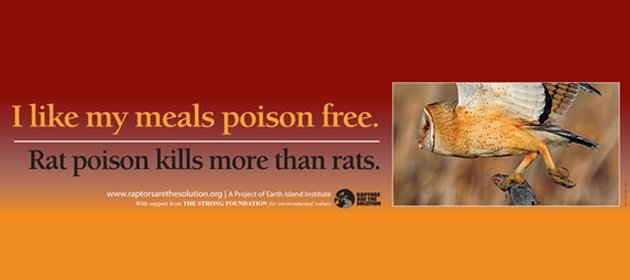
Mice/rats in your house or business? Call the pest control company.
A company representative will come to your door and tell you the poisons they use are “safe.” Alert: they’re lying.
“But they’re not allowed to lie,” said a man who told me he had found a dead hawk on his land. When queried, he admitted he had recently hired a local company to get rid of the mice in his house. He seemed baffled.
“Safe … poison,” I said. “There’s no such thing. It’s a contradiction in terms. They’re mutually exclusive.”
Most people don’t understand what they’re doing when they use rat poison. The rodents eat the bait, stagger out of the building looking for water, and are easy prey for whatever carnivore happens to be passing by, be it wildlife or someone’s pet. A poisoned rodent can kill whatever eats it, and death by poison is a very bad way to go.
The kicker is you don’t even have to hire a company that will lie to you about how safe their poisons are – you can just assume government agencies are watching your back, buy it from a store, and use it yourself.
By the early 1980s, the Environmental Protection Agency (EPA) was aware that poison control centers were reporting 12,000 to 15,000 calls annually regarding children under the age of 6 ingesting rat poison, and rodenticides were documented as causing large numbers of secondary poisoning in wildlife. In 2004 – more than 20 years later – the Natural Resources Defense Council (NRDC) had to sue EPA in order to get them to do anything about it. Four years later, EPA gave poison manufacturers three more years (are you adding this all up?) to eliminate the most toxic of their ingredients and to repackage their products more safely. Three companies refused to comply: Reckitt Benckiser, Liphatech, and Spectrum Group.
EPA began cancellation proceedings, and at the eleventh hour Liphatech and Spectrum Group pulled the most dangerous of their products from the shelves. However, the day before the deadline, Reckitt Benckiser (the manufacturer of D-Con) contested EPA’s decision. This means not only can they continue poisoning kids, pets, and wildlife for years while the case drags through court, but now they have a monopoly on the market.
Need an example of “hypocrisy?” Look no further than Reckitt Benckiser’s website: “The Company strives to act in accordance with the laws … of the countries in which it operates, (and it) operates with integrity.”
What to do?
Support and follow Raptors Are The Solution (RATS), a Berkely, CA group whose goal is to get all poisonous rodenticides off the shelves. Originated in 2007 as a one-woman war by former Wildcare volunteer and raptor enthusiast Lisa Viani, it grew into an effective, hardworking coalition of citizens which attained non-profit status and then became a fiscally sponsored project of Earth Island Institute.
RATS is co-founded by Golden Gate Raptor Observatory Director Allen Fish and favors the multi-pronged approach: blanketing the press with articles, producing leaflets and pocket guides, copying San Francisco’s Don’t Take the Bait campaign (which persuaded retailers to voluntarily stop selling certain poisons) and successfully installing it in 15 other cities.
Images of the Barn Owl above have been posted in subways and bus stations; a huge banner will soon grace the Montgomery Street BART (Bay Area Rapid Transit) station in San Francisco; and in the works are billboards to be posted in Northern California, where marijuana growers’ use of rodenticides is impacting local raptor populations (“Did Your Pot Kill A Hawk?”) as well as a rare mammal, the California fisher.
RATS persuades local governments to pass anti-poison resolutions using facts, figures, photos, and a Claymation video (“Raptor Blues”) made by high school student Ian Timothy (which, Lisa observes, often makes people ‘get it’ far faster than the written word). They fight ludicrous new proposals, such as the one which would take rat poison out of the hands of the public, yet allow pest-control companies to use it as long as it is within 50 feet of a building (seriously). They pass around the website of Safe Rodent Control, which gives alternatives to poisons.
Kudos to this awesome group, which has changed minds, laws, and continues to raise awareness of an environmental disaster which too many people don’t even realize has been taking place.
And a derisive raspberry to Reckitt Benckiser, whose website declares, “We are committed to helping to improve children’s health, hygiene and social development around the world,” but doesn’t add, “except the ones who keep eating our badly-packaged rat poison.”
Besides D-Con, Reckitt Benckiser manufactures Woolite, Calgon, Finish, Lysol, Mucinex, French’s Mustard, Clearasil, etc. See the website for a self-congratulatory description of their efforts to plant trees, but no mention of their slaughter of the birds who might want to land on them. Scroll to the bottom for a list of products you can boycott.
Photos of Cooper’s Hawks by Tony Brake.
















Thank you for this! I will boycott all those products.
But why didn’t you mention the’no secondary kill’ rat poisons?
Cynthia
RATs is a great group that is educating the public about the truth of rodenticides and the deaths it causes not only raptures, but wildlife and pets also. We need you in NY! Keep on keeping on!
Lisa continues to do an excellent job working to make this issue public. If more people understood what they were doing, they wouldn’t do it. When this gets all the visibility it deserves, it will be the brand name of RB that is poisoned.
Hello Cynthia,
To our knowledge, there are no “no secondary kill” poisons out there. If someone is telling you that, they are very likely lying. There is a product called “Bromethalin,” which is a nerve toxin and very very dangerous and completely lethal to dogs. There is no anti doe to it. Unfortunately, without enough studies, the EPA has fast tracked this product, and we are very worried about the result. There is also zinc phosphide, which can also be lethal to pets– and even to the vets that treat them–but no data on secondary poisoning. Until there is proof that these products do *not* cause secondary poisoning, I would not use them. As Suzie points out, there is an inherent contradiction between “poison” and “safe.” There is *always* some impact, somewhere, from poison. Snap traps are probably the safest (if placed where birds and other wildlife cannot access them) solution. There is also a product called The Raticator that is supposedly very effective.
Thanks Suzie for the info. We KNOW they are full of shit and must do out best not to use the poisons.
Interesting how perspectives vary by nation. In New Zealand the government dumps tons of mammal poison into the most precious national parks, and us greenies want more!
This is a prime example of the insanity that goes on in this country re poisons: they finally try to phase out anti-coagulants, then they replace them with something like Bromathalin, which is almost impossible to detect and, as Lisa said, THERE IS NO ANTIDOTE. Are we kidding? Here is a link which describes the effect the stuff has on pets: http://healthypets.mercola.com/sites/healthypets/archive/2013/05/24/bromethalin.aspx
Duncan, are you talking about the bovine TB/opossum poisoning? Are you for it?
The Rat Zapper works very well if you keep the batteries fresh. We also use a little cage type trap and of course some of the common snap traps. So far we are keeping just ahead of the rodent invasion in all these ways.
Suzie, I’m talking about the use of 1080 to control introduced mammals. Farmers like it because it controls bovine TB, conservationists like it because it controls rats and possums that are wiping out native species. And yes, I am very much for it.
So Duncan, you do not care if raptors and other non-target animals perish too? Or that the entire ecosystem is thus poisoned??
Lisa, kindly inform yourself of the different context poisoning has in New Zealand. The land has been poisoned, by invasive mammals which devastate an ecosystem that never had any before other than bats. We only have two raptors, the only one of which that might be poisoned being common as muck. There is some low levels of incidental poisoning of natives, but the mortality rate is way lower than the rates lost to mammals. Without poisoning many NZ species will be extinct within twenty years. It’s unfortunate we have to poison, but we are lucky to have 1080, a poison that doesn’t bioaccumulate, breaks down naturally and is generally harmless to our threatened endemics.
What I just said, only without the snotty way I said it (it was a long flight, sorry).
Duncan, do you know why 1080 is “tightly controlled” in the US, while anti-coagulants, which are much more dangerous, are given free rein? I figure you’d probably know this off the top of your head, while I’d have to do all kinds of investigating. I suppose it has to do with corporate payoffs to government officials.
I imagine it has something to do with the way it works, but I don’t actually know. It’s a very nasty way to die.